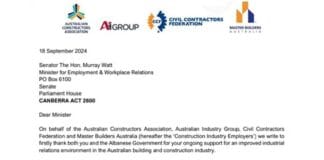Solidarity spoke to a Sydney rail worker about the ban on strike action and why rail workers deserve a better agreement
What does the Fair Work Commission’s (FWC) decision to rule the 29 January rail workers strike illegal mean going forward?
If you look at wage growth, it’s stagnant. At the same time industrial action has decreased by 97 per cent since the 1970s.
So for workers to lose their only bargaining chip, which is their right to strike—even in a protected action period, which has been officially validated and vetted by the Fair Work Commission—is a disgrace! And it shows the rules in place to protect workers in a period of bargaining are broken.
The whole point of a strike is to show how powerful workers’ labour is within an economy and society. We require the labour of qualified, highly-skilled, routinely re-assessed train drivers, signallers etc. in order to run our train network safely.
The NSW government needs to know how important rail workers are to keep our economy going. The current offer show how little the care about their workforce which puts in 110 per cent.
Our work should be respected and currently it is not.
There is uncertainty whether the union officials will go ahead with further industrial action, but rail workers are ready to keep the fight going after the six-week ceasefire.
We should go ahead with overtime bans and rolling strike action to show how even removing our labour for small periods of time affects the economy.
But, in all seriousness, the rank and file needs to be organised and prepared to side step and organise their own action irrespective of FWC rulings or the union officials’ decisions.
If the FWC rules industrial action illegal again, we should strike anyway, we should just walk off.
What do you think of the new deal?
The new deal is being sold to all employees as a 4.06 per cent per annum pay increase. But in fact it’s only 3 per cent, 0.25 per cent more than what was already on the table. They’re including a one off payment of $1000, seven days domestic violence leave, extending five days critical incident leave to all staff. This is how they’re coming up with the 4.06 per cent figure.
Regarding the critical incident leave, train crew already had it and, more than likely, they’ll remain the only ones that will use it, so not much change there.
We now need to provide a medical certificate if we’re sick for two days, down from three.
I should point out that the new deal does not include back-pay for the time that has passed since our last Enterprise Agreement (EA) expired. Unfortunately, the union bargained away the back-pay clause in the 2014 EA. Previously if we agreed to a new EA we got back-pay.
With all the problems around the new timetable, what is the state of rostering?
There’s a fortnightly master roster. But we have constantly changing start times. There’s no real pattern to it. One day will be a 4AM start, the next 8AM, the next 6AM. It’s really hard to plan your life around your shifts; it’s doesn’t allow for a good quality of life.
Part of the new agreement allegedly includes better guidelines around rostering.
But generally, most people are really, really frustrated around the implementation of the new timetable. Drivers were working up to 13 days a fortnight with a huge amount of pressure to accept the shifts because there were simply not enough drivers.
When the new timetable was introduced they knew at the time they were 80 drivers short.
This led to excessive amounts of overtime and drivers doing a lot more kilometres; they’re working 6.5 to 7 hours of their 7.36 hour shift.
Apparently, the driver of the train that crashed at Richmond in January had done a ton of hours in the lead up to the crash.
What is the feeling amongst rail workers about the new offer?
A lot of rank and file rail workers and delegates are not happy with the new deal—I think most will vote it down. People are quite exhausted and want it over with but we understand why we need to say no. The Combined Rail Unions want a good package with a minimum 4 per cent pay increase per annum.
Interview by Matt Meagher





